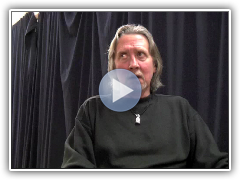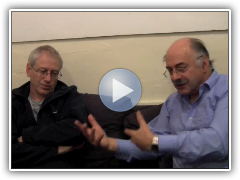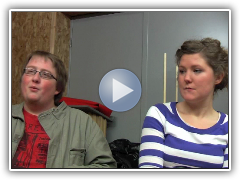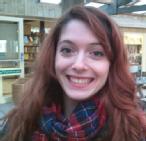Dr. Jessica Mordsley Describes The Writing Process
|
Having secured funding, ‘Not My Fault’ had its creative beginning in November 2009. Theatrescience invited five established playwrights and five young emerging writers to spend a weekend at the Eden Project to learn about current issues in genetic science. The aim of this was to inspire and inform them to devise ideas for new theatrical pieces to be performed at Eden in 2010.
Writers were recruited through Soho Theatre and various arts organisations in the South West. An important aim of the project was to recruit not only established playwrights, but also young writers who were just starting out on their careers, in the hope that the project would play a formative role in engaging them with science in a lasting way.
The weekend programme consisted of five sessions in which experts in the scientific, social, legal, and clinical aspects of genetics gave an overview of current thinking in their field, followed by discussions with the writers.
The weekend also included a tour of the Eden Project by Eden staff in order to view the potential theatrical spaces, and opportunities for informal discussions between the writers, scientists, and the Theatrescience team.
|
The Naxalite movement and politics in
State of Nature:

Video Information
|
|
In addition, Jeff Teare and Simon Turley led a workshop for the five young writers. This included an ‘automatic writing’ exercise and another exploring reaction to location. The writers’ initial response to some of the science input was also discussed as well as reactions to the Eden Project.
Participants were provided with a ‘Writer’s Pack’ in advance of the weekend, intended to introduce them to the themes of the project and to spark off their initial thinking about genetic predisposition. This contained some basic information about genetics, plus recent news articles about genetics.
Following the weekend, the Theatrescience team distributed notes to all who had attended, containing detailed write-ups of each session, which served as a useful reference for the writers as the project continued.
The writers were invited to submit pitches by the end of the year; all of the professional playwrights and three of the young writers did so. Of these, two playwrights plus three young writers were commissioned. Another playwright submitted a pitch which was not considered suitable, but after discussion with the team she later submitted a revised pitch which was commissioned.
|
Religion in State of Nature:

Video Information
|
From the outset, each writer approached the project with different expectations of how a collaboration of this sort might work; for example, one participant had expected “to make connections with a particular scientist who sparked new ideas in order to develop a pitch together”, i.e. seeing the scientists as potential co-creators, whereas another saw them as “lecturers” whose role was simply to impart information. Of the five scientists who addressed the group, two went on to act as scientific advisors for commissioned plays. For the other four plays, experts in the relevant scientific fields were approached by the company.
The development process from this point on separated into several strands as each writer worked on their pitch and then their first draft, with guidance from Jeff Teare as artistic director/dramaturg, and began communicating, and in some cases meeting, with their scientific advisors.
The young writers were closely mentored throughout the project, receiving feedback from Jeff and Simon Turley, as well as from their advisors. The professional development of the young writers was one of the outstanding positive outcomes of the project.
The established writers were also supported throughout the writing process with close communication with the Theatrescience team.
|
Jack Redmond and Sophie Macdonald talk about writing their short plays:

Video Information
|
Kitty O'Keeffe, writer for Perfect Match, was unfortunately unavailable for interview, but kindly contributed the following by email:
|
- What scientific assistance did you have with Perfect Match, and how did you find the process of collaboration?
I think my piece was unique of the short plays in that I wasn't assigned a scientist to work with - only because it was unnecessary. I did research myself into DNA testing, and cross-referenced it with my Biology graduate friends. The technical terms in my play should all be present and correct and logical, the same cannot be said about how the technology is then used!
Whilst I did not have assistance during my writing process, the scientific, medical and emotional talks held over the course of the workshopping weekend at Eden last November, truly was inspiring, and pre-emptively helpful.
|
 Kitty O'Keefe Kitty O'Keefe
|
|
- What was your previous feeling on science with theatre, and has this changed?
I don't think I really had any feelings at all on science/theatre combinations. I'd never thought about it. So the fact that I now do think about it is quite significant I suppose. The thing is, though it's not the only work that Theatrescience does, the plays they commission aren't about science: they're about people. It just so happens that these people, and their stories, happen in the context of medical and ethical issues. Every aspect of the plays (the science, the ethics, the story), is sensitively handled and well researched. This seems unique to a collaborative process that involves writers, scientists, and those with first-hand experience of the issue in question.
|
|
|
- With the brief being centered on genetic difference, where did the idea for a comedy piece come from?
From the other part of the brief, which was about the short piece being site and time-specific to an ordinary working day in the Eden project. I thought about what I'd like to come across if I was wandering through the Biomes. First, I thought I'd want to stumble upon one of the delicious pasties from the cafeteria, and, failing that, that I'd want to laugh.
- How, if at all, did knowing that the piece was going to be staged at Eden affect your writing?
I just wanted it to be engaging to passersby, young and old alike. Hence the garish big box [...] have you seen the eden project? Every bit of it is captivating! I wanted to fight for attention a bit.
-Finally, after seeing the piece rehearsed/performed, did it look how you expected or were there any moments that surprised you?
It looked even better than I'd expected. Which is obviously nice. I hate the idea of ever being precious about the way something written for a stage is adapted. That's the whole point, they're not written to be read to oneself, they're written to be performed. Inevitably, changes have to be made to scripts because there's no real way of knowing how they'll be when they're on their feet. Especially with the elements of audience participation in Perfect Match.
|
|




 Kitty O'Keefe
Kitty O'Keefe